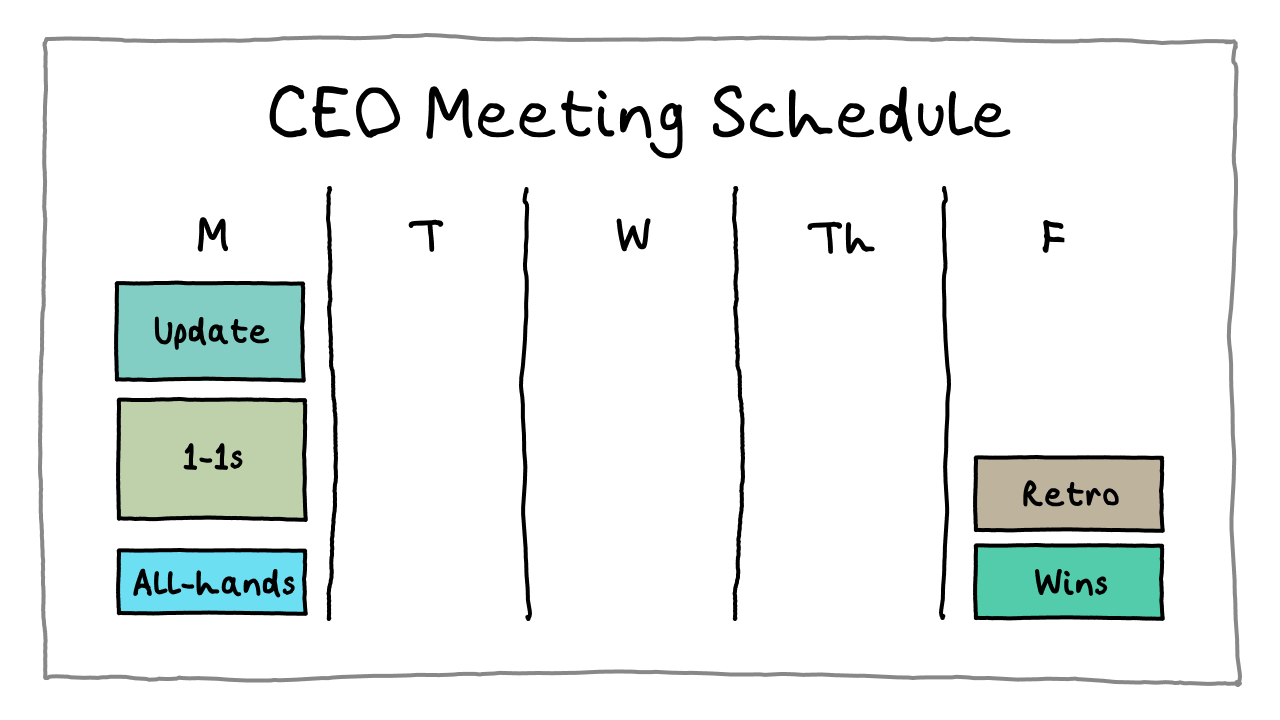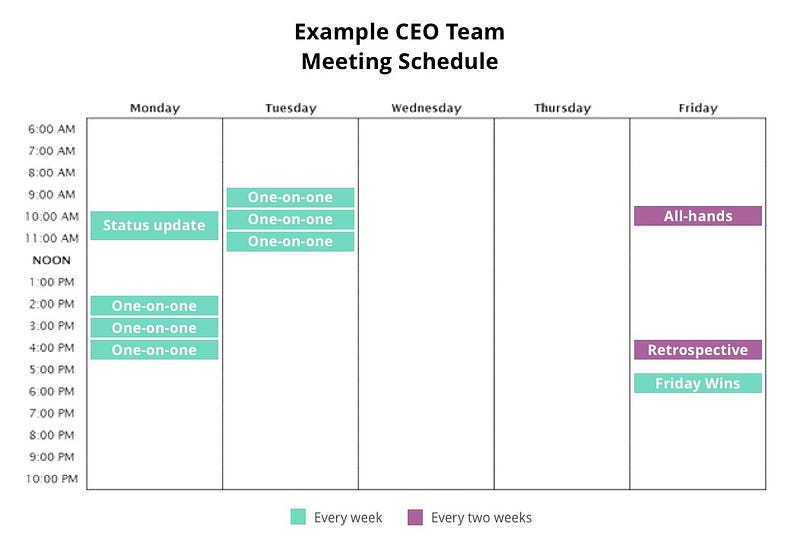The Five Meetings Every CEO Should Lead
Written by Dave Bailey
When your whole company works in the same room, news gets around fast. Impromptu meetings, discussions over lunch, and overheard phone calls mean the team usually has a good idea of what’s going on.
But as a company grows, more formal methods of communication are needed to keep everyone in the loop. And when communication breaks down, it leads to a set of common issues. How many of these do you recognise?
- The team aren’t sure of the status. When actions are promised but not followed up, the team can lose trust that anything will happen.
- The team can’t see the big picture. Many people don’t have enough information to understand why certain decisions are taken, or what others are working on.
- The team don’t have clarity on what to do. Expectations are hard to manage, especially when situations change on a regular basis.
- The team sit on feedback for too long. When feedback isn’t given or received, emotional baggage builds up and weighs on everybody’s minds.
- The team feel that their work isn’t recognised. Non-visible work is taken for granted, as are the sacrifices that go into making it happen.
There comes a point when regular meetings are needed to address these issues. Founders can go from virtually no formal meetings at all, to a calendar so full of them that they have little time left for actual work.
Learn new skills every week ->
So, what are the most important meetings for founders and CEOs and how should you run them to avoid these issues?
The CEO Weekly Meeting Schedule

Meetings are the backbone of communication among a company’s leaders. When I start coaching a CEO, we document all the regular leadership and team meetings, and how often they happen.
I’ve noticed a striking pattern: I can predict many of the leadership’s key concerns just by seeing the CEO’s meeting schedule. When certain meetings are missing, the consequences are often inevitable.
Here are what I consider to be the most important meetings to keep information flowing as it should. Every CEO should include them in their weekly or bi-weekly agenda.
1) Status update (for accountability)
This is also known as a planning meeting, a leadership meeting, or simply ‘the Monday morning meeting’. Irrespective of name, it’s when the leadership team can review what’s happened, align on the plan for the coming week, and share their blockers. Team members can hold each other accountable for executing their plans by asking good questions.
When there are just a few people, the entire team might attend status updates. However, status updates don’t scale. As roles specialise, every employee’s update becomes less relevant for everyone else. At some point, it makes sense to split a status update in two; one for leaders, and a separate meeting for the entire team (don’t worry — that’s coming up next).
It’s worth spending time on the status update to get it right. If you and your team can leave the meeting with a deep sense of what’s going on, it allows you to step out of a lot of departmental meetings that would otherwise swamp your calendar.
Finishing the week with a status update may sound plausible, but I’ve found that it’s not a great idea in practice. Most status updates end with a sense of urgency, which is better leveraged at the beginning of the week.
The key to a great status update is preparation. When leaders arrive with their metrics updated and a concise report on key questions in their area (rather than making it up on the spot), it buys extra time for discussion and collective problem-solving.
When you have your best people in the same room, you have to make the most of it.
2) The all-hands meeting (for transparency)
As the name suggests, all team members attend an all-hands meeting, either remotely or in person. Leaders give updates on each department, make announcements, and align around the company’s mission and strategy.
It’s a great chance to recognise key milestones and acknowledge the team’s hard work every week by showing what they’re working on.
It’s also an opportunity for employees to put questions to leaders. When communicating with others, we often unknowingly assume that they have the background to understand what we’re talking about. This is known as the ‘curse of knowledge’. By allowing the team to ask questions, we allow them to fill gaps in their understanding, so they can see the bigger picture.
Taking questions from the team holds leaders accountable to their employees — and accountability drives better results. That said, leaders don’t need to have an answer for everything and when you don’t know the answer, acknowledge it: ‘That’s a great question and I don’t have the answer. But here’s what we can do to work it out.’
The key to a good all-hands is curation. Ask yourself, ‘What is really important that every single person in the company should know about?’ Keep it relevant so everyone is engaged and energised.
3) One-on-ones (for expectations)
The purpose of a one-on-one is to coach individual team members on their personal development by working through issues in their work, and to set expectations on both sides. This might involve reflecting on key challenges, identifying ways to improve, and clarifying priorities.
If you use one-on-ones to review the status of tasks, it might be a sign that you’re too operationally involved in your leaders’ day-to-day tasks. Instead of reviewing tasks and telling them what to do, ask yourself:
‘What are the most important questions I would ask myself if I were in their shoes?’
Those are the questions that you should be asking. Stay curious to find out what’s motivating their answers — understanding motivation is a big lever for impacting performance.
At the end of a one-on-one, you should agree on a set of concrete next steps. If the individual can take them without your help, they must do so or your to-do list will fill up with other people’s action items (a common issue for CEOs).
The key to a great one-on-one is self-restraint. The more you coach and help your team find their own answers, the better off you’ll be in the long run. As my mentor once told me, ‘Coach the person, not the problem.’
Learn new skills every week ->
4) Retrospectives (for feedback)
Done well, a retrospective allows a team to listen to each other in safety. A classic ‘retro’ has three parts:
- What went well?
- What didn’t go well?
- How can we improve?
To make it safe for team members to be honest, it’s worth setting the expectation that the meeting is not about solving problems — it’s just about listening. Few things will better teach people to keep their problems to themselves than an unrequested solution.
Starting with what went well helps get people in a positive frame of mind. If you listen carefully, you’ll hear what energises people and makes them proud. As you move on to what didn’t go well, you’ll hear what’s weighing on their minds. And believe me, in a growing startup, we all need to regularly vent our frustrations, so they don’t build up to dangerous levels!
At the end of the session, the team choose one or two areas to focus on and make changes to improve the situation. Given that two changes a week equals around 100 changes a year, significant improvements can be made over time.
The key to a good retrospective is empathy. We’re all human and we all need connection. By acknowledging people’s successes, hearing their frustrations, and making improvements, the whole team leave lighter and happier.
5) Friday Wins (for recognition)
In a ‘Friday Wins’ meeting, the team come together at the end of each week on a high note. Every department tells — or, even better, shows — something positive that happened during the week.
In a startup, it can take years for hard work to pay off. While most leaders understand the value of celebrating the small wins, it’s really hard to do in practice.
When almost everything is either unfinished or uncertain, there’s a fear that celebration will lead to complacency. The mantra becomes ‘Don’t look back . . . keep focused on where we’re trying to get to.’ Unfortunately, failing to recognise hard work can build up into resentment: ‘I work so hard and I’m totally taken for granted.’
Allowing yourself and your team to celebrate the small wins on a regular basis can help meet the team’s need for recognition and increase a sense of connection. This is more likely to increase motivation than decrease it.
The key to a good Friday Wins is gratitude. Gratitude is the antidote to a host of negative emotions. Naomi Williams famously said, ‘It’s impossible to be grateful and depressed in the same moment.’
How Good Are Your Meetings?
Implementing and improving your meetings with the team might sound like a heavy time investment. However, while they can take up 20% of your time, they represent 80% of your leverage as a CEO. After all, your results depend on other people.
Some companies can get away with holding these meetings every two weeks — but when it’s longer than that, communication issues predictably start to occur.

Marie Kondo puts it wonderfully:
‘Anxiety comes from not seeing the full picture.’
Status updates, all-hands, one-on-ones, retros, and Friday Wins can help information and feedback circulate as it needs to. And maybe these meetings can make everyone a little less anxious — and a little more focused on the mission ahead.
Originally published Nov 19, 2019, last updated Jul 25, 2023
Learn a new skill every week
Subscribe to my weekly newsletter and learn new skills and mental frameworks that make startup life easier.
Unsubscribe any time.





